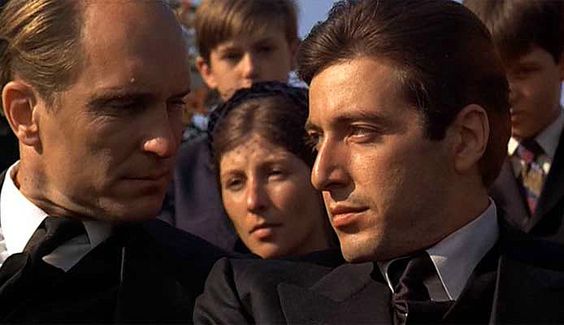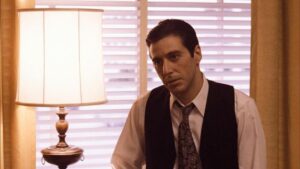
The Godfather, Part II’s Senate Committee

A major portion of Francis Ford Coppola’s The Godfather, Part II (1974) involves Michael Corleone’s interrogation by the United States Senate. Having returned from Cuba, where his business venture crumbles during Fidel Castro’s revolution, Michael’s faced with an investigation initiated by his rival, Hyman Roth. The Senators interrogate Michael’s henchman, Willie Cicci, who provides information on the Corleone family and his own crimes, but can’t implicate Michael directly. “The family had a lot of buffers!” he announces to general amusement.
Michael later testifies, confronting allegations about his criminal empire and personal transgressions. Michael coolly denies their accusations, then reads a prepared statement emphasizing his lack of criminal record and World War II service. Afterwards, he’s notified that the committee has a surprise witness: Frank Pentangeli, Michael’s capo who survived a hit by Roth’s henchmen, then turned against Michael for immunity.
Things don’t go according to plan. Michael convinces Pentangeli’s brother, Vincenzo, to attend the hearing, either has a threat against Vincenzo life or reminder of the Mob code of omerta. Pentangeli loses his nerve, claiming he invented his testimony under duress. The committee dissolves, with Michael walking scot free. Later, Tom Hagen persuades Pentangeli to commit suicide, saving his family and preserving his honor.
Coppola and Mario Puzo modeled these scenes off the Kefauver Committee, an early ’50s Senate body which investigated organized crime. The committee yielded no convictions, with many speculating that its instigator, Senator Estes Kefauver (D-TN) merely wanted publicity for a president campaign. (Kefauver ran in 1956, losing the nomination to Adlai Stevenson; he became Stevenson’s running mate). It did, however, plant the Mafia in America’s public consciousness: the hearings were widely televised, providing glimpses of underworld figures like Frank Costello and Meyer Lansky.
Another inspiration came from Joe Valachi. A henchman for Vito Genovese, Valachi was already jailed when he murdered another inmate, whom he feared was a Mob assassin. Threatened with life imprisonment or death, Valachi turned states evidence against Genovese, testifying before the McClellan committee in 1963. Like Willie Cicci, Valachi was too low-ranking to incriminate his bosses. But he did provide useful history and organizational detail on the Mafia, which assisted Federal prosecutors in future investigations.
Coppola filmed these scenes in two days, using unfiltered cameras and sound to create a newsreel look. He also cast non-actors as the Senators. Reviewing footage of the Kefauver hearings, Coppola was struck by the Senators’ awkwardness on film. “I asked myself, how could I achieve that effect?” Coppola recalled. “I’ll pick writers, producers and directors, all thinking men but untrained as actors.” He achieves the desired realism, with the Senators fluffing lines, referring to scripts and acting unrehearsed. But who plays the Senators?
The making of The Godfather trilogy is well-documented, but there’s a lot of vagueness and misinformation, both in printed works and the Internet, about these pivotal scenes. If nothing else, Godfather fans and trivia buffs might appreciate the chance to put faces to names.
G.D. Spradlin (Senator Pat Geary) needs no introduction, as he’s a major character in the film. A Nevada Senator, Geary tries “squeezing” Michael for a gaming license, only to be blackmailed in turn for murdering a prostitute. Geary later joins Michael in Cuba and turns up on the committee interrogating him. Having previously denounced Italian-Americans as oily criminals, he gives a ridiculous speech espousing Italian contributions to America, inspiring spectator applause and Senate befuddlement.
A larger-than-life figure, Spradlin was as interesting as any of his characters. Born in Paul’s Valley, Oklahoma, Spradlin worked as a lawyer, oil producer and political ad man. He ran John F. Kennedy’s Oklahoma campaign in 1960, making him natural casting for a Senator. But Spradlin’s real passion was acting, joining the Oklahoma Repertory Theatre before moving into film. Pre-Godfather roles include Tom Gries’ Will Penny (1968) and Michaelangelo Antonioni’s Zabriskie Point (1970).
Spradlin remained a prolific character actor, specializing in Geary-esque slimeballs. Besides Godfather, Part II, his best-known role came as the domineering basketball coach in Lamont Johnson’s One on One (1977). Coppola used him again in Apocalypse Now (1979) as the General briefing Captain Willard. Spradlin died in July 2011.
